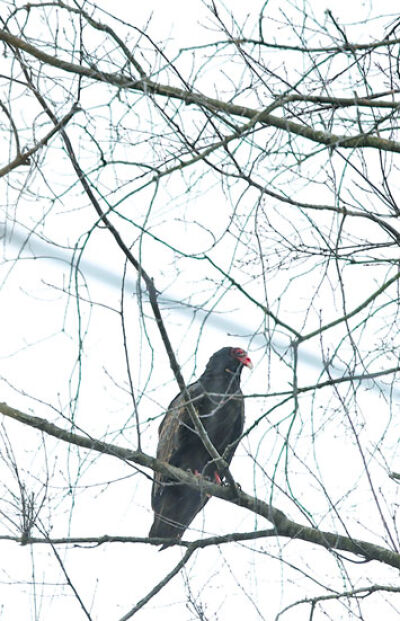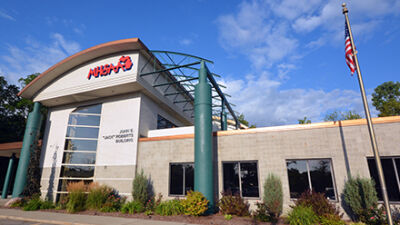MICHIGAN — When you get a moment, look up. Overhead, you may spot a group of large birds (or a single one) gliding around in circular patterns. From a distance, it may seem like a group of falcons or hawks or eagles but, more likely than not, it is a bunch of turkey vultures.
Spring is when turkey vultures make their way back to Michigan for the warmer months. Given these birds will be an ever-more common sight as the season goes on, there’s no better time to get to know the turkey vulture than when they’re moving in.
“A lot of people group (turkey vultures) with the birds of prey, but they aren’t birds of prey because they don’t eat live animals,” said Cathy Wesley, instructional guide and naturalist at the Johnson Nature Center in Bloomfield Township. “They eat carrion or dead things, and that tells you what their role is in the ecosystem.”
Serving as nature’s cleanup crew, turkey vultures eat the dead animals left roadside or in the wild. They have evolved to exceptionally fill this role, developing a unique-among-birds sense of smell and a strong, super-acidic gut.
“The pH of their digestive system is less than one, so it doesn’t matter how rotten and bacteria-filled the meat is,” Wesley said. “After it passes through their digestive system, it actually kills all the bacteria and everything so when they defecate, the bacteria has been killed.”
Turkey vultures have an interesting relationship with hygiene. Their bald heads prevent messes while eating carrion and they have long talons to clean themselves once they’ve finished feasting. They also spend the hot months urinating on themselves to cool down, evaporating the heat away in much the same way that sweat works in humans. There’s also the creative ways turkey vultures utilize their vomit as both a territory marker and a defense mechanism of their ground-based nests.
“To help protect their nests, the adults will actually vomit around the nest to keep predators away because it smells so bad,” Wesley said. “And also, the young, even before they can fly, are able to projectile vomit on any predators that come up to them.”
The craftiness of turkey vultures is not limited to weaponizing vomit. Turkey vultures have historically lived around more southern latitudes, but Wesley says they started making their way north as the nation’s highways were built.
“When the highways went in, that created more roadkill, which is what they eat.,” Wesley said.
Changing temperatures have also led to turkey vultures moving northwards, making them a common sight in the southeastern Michigan skies.
Though turkey vultures certainly do not have the most graceful appearance of any bird, they pose very little threat to humans and pets.
“Very, very, very occasionally they will eat something alive, and it’s usually something very small; more like rodents,” Wesley said. “But especially with the abundance of carrion, they don’t pose a threat to pets at all.”
When not in the sky, humans tend to come across turkey vultures while they are eating on roadsides or resting on a perch. According to Dr. Kevin Smyth, a veterinarian specializing in raptors at Morrison Animal Hospital in Garden City, roadside encounters are usually where human-caused injuries to vultures occur.
“The most common ones we see are wing injuries, usually from automobiles, although I’ve had at least one that someone saw run into a power line,” Smyth said. “Some of them get shot.”
Smyth finds turkey vultures to be “cantankerous” birds to treat when they come in. They tend to bite and twist with their beaks and throw up in self-defense.
Other common human-related injuries to turkey vultures include poisoning from lead ammunition and pesticides.
If an injured turkey vulture (or any wild animal) is found, Smyth says to call a Michigan Department of Natural Resources licensed rehabilitator for the closest veterinarian to treat them.
As time goes on, Wesley expects more vultures will make their homes in the metro Detroit area.
“The population is increasing, and that’s because when you have more people, you have more cars and more roadkill,” Wesley said. “And again, more people mean more garbage, which means more animals going to the landfills, which again attracts turkey vultures.”
More than 29,000 turkey vultures were spotted migrating over the Detroit River in the fall of 2023. Increasing temperatures open the door for Michigan and other northern latitudes to become year-round homes for turkey vultures, though increasing spring temperatures could make it too hot for vultures to lay eggs and raise young birds in Michigan.
For now, turkey vultures can be expected to remain a staple of summer skies and roadsides, cleaning up any mess that is left behind.
 Publication select ▼
Publication select ▼




























